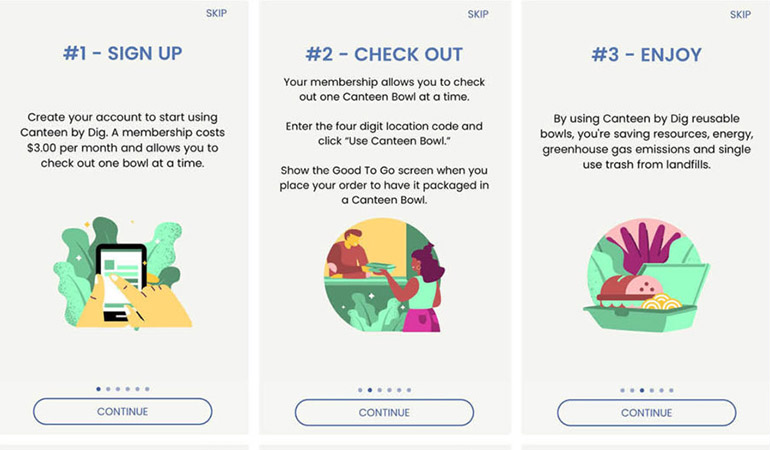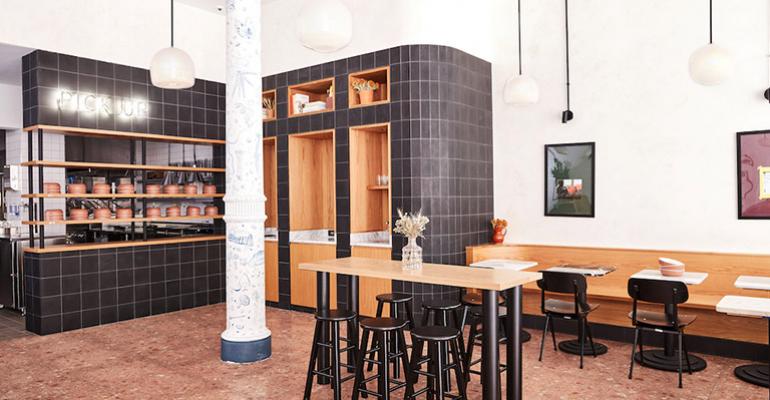Dig, the New York-based fast-casual chain, is testing a move into the reusables movement.
In the name of sustainability and creating a “closed-loop” environmental system, the chain is exploring the use of reusable containers.
Following in the footsteps of Just Salad, which has offered reusable plastic bowls for purchase and in-store use since 2006, Dig is also offering guests the option of a reusable bowl, but with less onus on customers.
Rather than relying on the customer to bring the cleaned bowl in every time they visit, Dig is doing the work for them, including clean-up.
Priced at $3 a month via the Canteen by Dig phone app, customers at the Washington Square Park location in New York City can enter this pilot program where containers are rented and returned and tracked via the app.
In a city where almost everyone rents, Dig is leaning into their hometown.
Customers pay the fee to rent bowls every month on their phone app, they then show the employee at Dig their app and the employee uses the reusable container for their order. The customer then keeps the container until the next visit at which time they bring it back to the restaurant where it is cleaned and returned to their stack of containers.
 These containers are made of black melamine, a hard-shelled material, with a white plastic lid. The reuseable bowls avoid the per- and polyfluoroalkyl substances, known as PFAS, typically used as a “grease-proofing” agent that have been called “forever chemicals” because they do not degrade quickly. PFAS were found in compostable bowls from several chains, including Dig.
These containers are made of black melamine, a hard-shelled material, with a white plastic lid. The reuseable bowls avoid the per- and polyfluoroalkyl substances, known as PFAS, typically used as a “grease-proofing” agent that have been called “forever chemicals” because they do not degrade quickly. PFAS were found in compostable bowls from several chains, including Dig.
The state of Oregon does not allow packaging that has PFAS in it to be composted, for example. Because other states are also considering similar standards, the Biodegradable Products Institute that certifies compostable packaging will require that fluorinated chemicals be kept under a certain level by the end of this year.
Dig has previously committed to being PFA-free by the end of 2020.
“We look at sustainability holistically — from intentional sourcing, waste reduction in our restaurants, to the way we train and support our teams. Going zero waste across our entire operation is a goal and we’re testing several programs to help us get there,” said Elizabeth Meltz, Dig’s head of environmental health.
The closed-loop system allows Dig to control the outcome, knowing how the bowls are cleaned before bringing them back into the system.
At the 50-unit Just Salad, customers typically re-use their bowls for up to a year said Just Salad CEO Nick Kenner, when speaking with Nation’s Restaurant News about the store redesign. However, they must be handled with caution and isolation when presented at the chain for order. Workers grab the reusable bowl with tongs and pass it down the assembly line so the surface isn’t contaminated by an object not sanitized according to the health department.
Just Salad has estimated that 30% of all in-store guests use a reusable bowl with a 33% rise in sales in 2019 alone.
California earlier this year introduced legislation outlining procedures for restaurants to handle reusable cups and containers. According to the law, restaurants must isolate the consumer-owned container from the serving surface or sanitize the surface after each filling.
A growing number of companies are providing reusable options for restaurants.
GO Box, for example, is currently operating in Portland and San Francisco and serves as a dishwashing and sanitation service. Restaurants can distribute take-out containers to customers who can in turn deposit the containers at one of the 40 designated drop-off points in the city. The containers are then sanitized and returned to the restaurants.
Dig currently offers bowls and utensils for dine-in to reduce waste, and there are plans to expand the reusable bowl system throughout the 29-unit system.
“As we expand to more drop-off points and more restaurants, we think we’ll actually be making it as easy to participate in the program as it is just to throw something away,” said Meltz.
This story has been updated with statistics from Just Salad.
Contact Holly Petre at [email protected]





